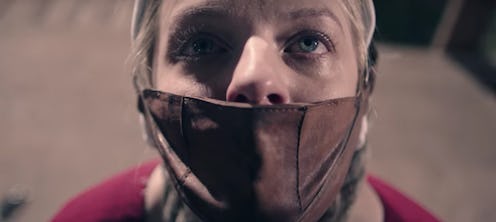As a show built upon the power dynamics that often dictate male-female relationships, it seems inevitable that The Handmaid's Tale Season 2 would be impacted by #MeToo. The series has proved an effective lens for real world issues, and often grapples with the same themes of misogyny, assault, and gender bias we've seen play out in headlines over the course of the last year. As showrunner Bruce Miller told The Hollywood Reporter in a recent interview, it "would be dumb not to see the parallels" between The Handmaid's Tale's dystopian patriarchy and our current political and social climate.
But, just as in the real world, that influence has extended off-screen, too. And as revelations continue to pour out about the systemic and often dangerous imbalance between men and women behind scenes, The Handmaid's Tale (executive producer: Reed Morano) continues to prove why it's a guiding force in television. In the same THR interview, Miller explained that the groundswell of sexual assault allegations still roiling over Hollywood hasn't just influenced their storytelling, but shifted the way they approach things off camera — particularly as a show that, though driven by women, is run by a man in a position not dissimilar from those who've been called out for alleged misconduct. Miller told the outlet:
"We've certainly had those discussions internally. We're constantly trying to create a safer and more comfortable work place, and this has opened our eyes to how unsafe and uncomfortable it can be for some people. We've redoubled our efforts to make sure we have an environment where people can talk about this stuff, so that if there are problems, we can solve them, so they aren't hidden from view for years and years and people have to suffer. The only way to solve anything is for people to talk about the problems.
In recent months, many shows have taken action to cut ties with alleged abusers: Mark Schwan (The Royals, One Tree Hill), Danny Masterson (The Ranch), and Kevin Spacey (House of Cards) were all fired from their respective series after allegations of sexual misconduct surfaced against them. (Schwan hasn't publicly responded to claims of harassment, while both Masterson and Spacey have denied accusations of rape). This certainly speaks to a changing culture. In the past, women's claims against powerful men have been predominantly ignored, or else quietly resolved. But now, they're starting to see loud, actionable consequences.
The Handmaid's Tale, however, is pushing things even further. Rather than waiting to address issues years after they've occurred, they're taking active measures to prevent them by forging safe spaces and open dialogue. That way, if inappropriate behavior does begin to take place, they can resolve it before it affects others or escalates to something more grave. Of course, that's an idealized approach. There are still a host of reasons victims might hesitate to come forward, and the Handmaid's team is only able to enact these policies because of the allegations that have since come to light. Without them, they may not have had the same foresight.
But it's nonetheless a step in the right direction, and it's unsurprising that it comes from a show that's been so instrumental in changing the conversation. The Handmaid's Tale's first season arrived at a particularly felicitous time, right on the heels of Donald Trump's election, when many women felt their rights and agency were at risk. In turn, the series acted as a mirror for those fears, serving as a call to arms for real-world viewers. And in the months that followed, an awakening ensued within the very industry that had enabled The Handmaid's Tale to exist. It's not a direct correlation, but it's a significant one, and as the show heads into Season 2, it continues to set the standard for feminist television, on screen and off.
